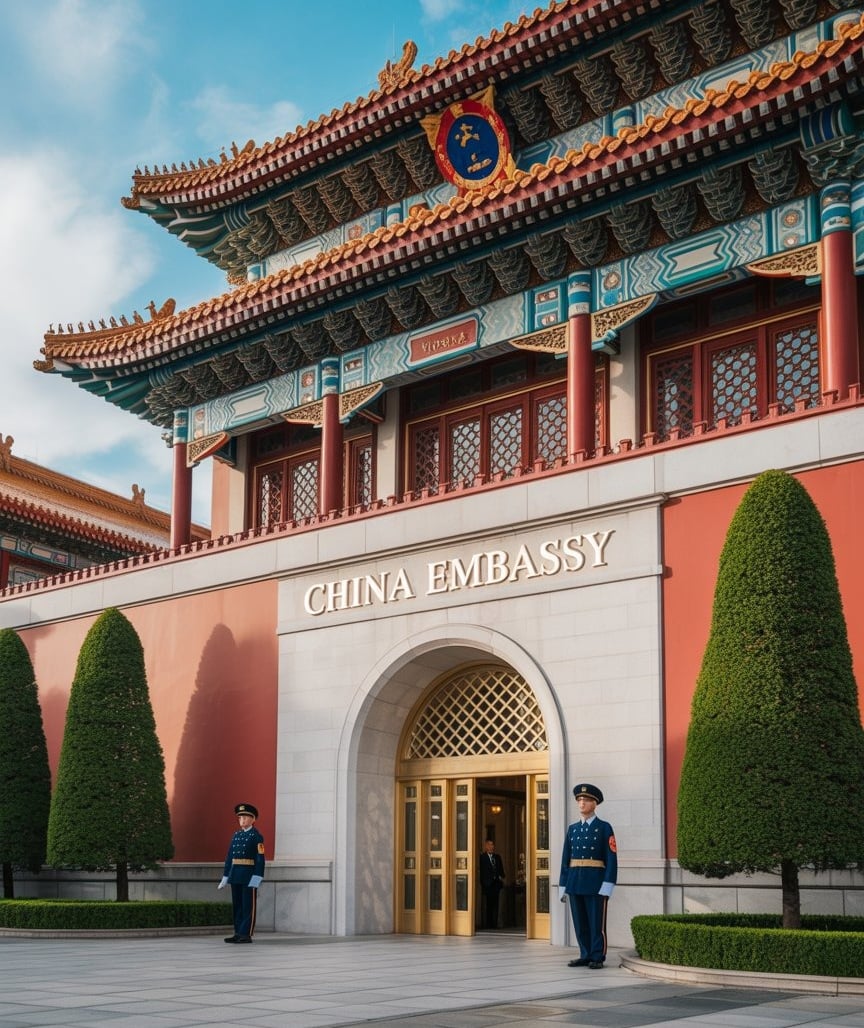Hassle-Free China Embassy Attestation: Guide "hassle-free attestation"
Discover the complete guide to hassle-free China embassy attestation, including essential documents, fees, and timeline for a smooth process. Ensure your paperwork is ready for successful attestation."hassle-free attestation"
11/11/20257 min read


Understanding Embassy Attestation
Embassy attestation is a crucial process involving the verification of documents by respective embassies or consulates. This procedure serves to authenticate the legitimacy of various documents that individuals and businesses intend to utilize in a foreign country. In the context of China, embassy attestation is vital for ensuring that documents such as educational credentials, personal identification papers, and corporate documentation are recognized as valid by Chinese authorities. Without this verification, the acceptance of these documents in China can be compromised, leading to unnecessary complications and delays.
The importance of embassy attestation cannot be overemphasized, particularly in legal, educational, and business frameworks. For individuals seeking to pursue higher education or employment opportunities in China, presenting attested educational documents is often a prerequisite. Similarly, corporate entities may need to authenticate business licenses, contracts, and other official documents to engage in trade or investment activities within China.
In addition to serving as a verification tool, embassy attestation acts as a safeguard against fraudulent documentation. By ensuring that all pertinent documents are authenticated, the process helps maintain the integrity of international transactions and communications. Moreover, the attestation adds a layer of legitimacy that reassures Chinese authorities of the authenticity of the presented documents. The growing emphasis on compliance with local regulations and standards makes this step increasingly mandatory for individuals and businesses preparing to operate in China.
Ultimately, understanding the process and necessity of embassy attestation is indispensable for those intending to navigate the requirements imposed by Chinese authorities. Properly attesting documents not only adheres to legal standards but also streamlines the operations of individuals and organizations entering China.
Required Documents for China Embassy Attestation
The process of obtaining China Embassy attestation necessitates specific documents that vary depending on the purpose of the attestation. Below is a comprehensive list of the essential documents required for this procedure, along with their specifications and any necessary translations.
Firstly, educational certificates form a crucial part of the attestation process. This includes degrees, diplomas, and other academic qualifications. Each educational document must be issued by a recognized institution and should be original or a verified copy. Moreover, it is advisable to have these documents attested by a local authority or an educational board before presenting them to the embassy. If the documents are not in English or Chinese, certified translations must accompany them.
In addition to educational certificates, birth certificates and marriage certificates are also indispensable for attestation. A birth certificate serves as proof of identity and age, while a marriage certificate may be required for spousal visas or residence permits. Similar to educational documents, these should be authentic and, if necessary, translated into English or Chinese by a recognized translator.
For individuals seeking business-related attestation, documents such as registration certificates, art of incorporation, and partnership deeds are crucial. These business documents must accurately reflect the entity's legitimacy and operations. They should also be presented in original form along with certified translations if they are in a different language. Furthermore, financial statements and tax compliance documents might be required, particularly for business-related visa applications.
Ensuring all documents meet the embassy's requirements can facilitate a smoother attestation process. Therefore, applicants should carefully review their documents and obtain professional guidance if needed, as missteps could lead to delays or rejections in the attestation proceedings.
Fee Structure for Attestation Services
The fee structure associated with the attestation process at the China Embassy is essential for applicants to understand for effective budgeting. The costs can vary significantly depending on the type of document being attested. Typically, official documents such as educational certificates, marriage certificates, and business documents fall into distinct pricing categories. For example, the attestation of educational certificates may range from $50 to $150, while marriage certificates could incur similar fees or slightly differ based on their complexity and required verifications.
In addition to the standard fees, applicants should be mindful of any potential additional charges. These may arise from the need for expedited services, which allow for faster processing times. Expedited processing can add anywhere from $20 to $100 to the original document fee, contingent upon the urgency of the request. Furthermore, applications submitted through third-party service providers might also incur additional handling or service fees, which can vary based on the provider’s policies. It is advisable to inquire explicitly about such costs when selecting a service to ensure a clear understanding of the total expense involved.
It is crucial to consult the official embassy website or a reputable service provider to obtain the latest fee schedule, as these fees can fluctuate over time and may differ based on current policies or economic conditions. Applicants should also consider any additional documentation that may be required, as this could influence overall costs. By being thoroughly informed about the fee structure for attestation services, applicants can prepare adequately and minimize unforeseen financial burdens during their attestation process.
Application Process for Attestation
The application process for embassy attestation is a systematic procedure that requires careful attention to detail. To initiate the process, applicants must first gather the necessary documents, which typically include original certificates, identity proofs, and any relevant supporting documentation. Ensuring that all documents are complete and correctly formatted can help avoid unnecessary delays during the attestation process.
Once the documents are prepared, the next step is to determine where to submit them. Applicants should identify the appropriate Chinese embassy or consulate that handles attestation services based on their geographic location. Each embassy may have specific requirements and processing times, so it is advisable to review the official website of the chosen embassy for detailed instructions on document submission methods, whether in-person or via mail.
After submission, tracking the application becomes crucial. Many embassies provide a tracking system or a confirmation receipt that can be used to check the status of the attestation process. Regularly checking this status can provide updates on the progress and alert applicants to any issues that may need to be addressed. In cases where additional information is required or documents need correction, timely response is vital to ensure a smooth process.
In summary, successful embassy attestation hinges on meticulously preparing documents, correctly submitting them to the designated embassy or consulate, and actively tracking the application progress. By adhering to these guidelines, applicants can facilitate a more efficient and hassle-free experience during the attestation process for their documents intended for use in China.
Timeline for Processing Attestation Requests
When seeking China embassy attestation, it is crucial to understand the processing timelines associated with various types of attestation requests. Generally, the timeframe for processing can vary significantly based on several factors, including the nature of the documents, the complexity involved, and the current workload of the embassy.
For standard attestation requests, such as personal identification documents, academic certificates, or business-related paperwork, the typical processing time ranges from 5 to 10 working days. However, this can extend to 2 to 3 weeks if the documents require additional verification or if they are subject to special regulations. It is important to note that more complex requests, particularly those involving legal documents or translations, can take up to four weeks or longer, depending on the circumstances.
Several elements can influence these timelines. The embassy's workload at the time of request submission plays a significant role; during peak seasons or periods closely following public holidays, processing times may be notably prolonged. Additionally, if the documents submitted lack proper authentication from relevant authorities, this can result in further delays as the embassy may require additional verification steps. Lastly, specific public holidays observed in both China and the applicant’s home country can impede processing times, potentially pushing back the anticipated completion of the attestation request.
In light of these factors, it is advisable to plan accordingly and submit attestation requests well in advance of their intended use. By doing so, applicants can avoid unnecessary stress and ensure timely processing of their documents. Understanding these expected timelines can facilitate a more efficient attestation process when dealing with the China embassy.
Tips for a Smooth Attestation Experience
Obtaining a seamless attestation experience for documents intended for use in China can significantly reduce frustration and ensure timely processing. One of the foremost recommendations is meticulous preparation of the required documents. Before initiating the attestation process, individuals and businesses should create a comprehensive list of the necessary papers, such as educational certificates, corporate documents, and identity proofs. Each document must be carefully reviewed for accuracy and authenticity, as discrepancies can lead to delays.
Furthermore, it is crucial to adhere to the specific requirements set forth by the Chinese Embassy or Consulate. Understanding their document validation protocols will aid in ensuring that all needed elements are included. To avoid common pitfalls, applicants should ensure that their documents are not only translated accurately but also legalized by relevant authorities prior to submission. This step is essential, as improper documentation is a frequent reason for delays in the attestation process.
When engaging the services of a professional agency, it is advisable to conduct thorough research to select a reputable attestation provider. Look for recommendations, read reviews, and inquire about their expertise in handling China Embassy attestation. A reliable provider can navigate the complexities of the process efficiently, offering insights that an ordinary applicant may overlook. Moreover, they can often speed up the timeline, which is particularly beneficial for those with pressing deadlines.
Lastly, maintaining open lines of communication with the attestation service provider can enhance the experience. Regular updates and clarity on progress will alleviate anxiety and ensure that any potential issues are addressed promptly. By adopting these practices, individuals and businesses can significantly streamline their attestation journey, paving the way for successful document validation with minimal interruptions.
Common Challenges and Solutions
When seeking China embassy attestation, applicants often encounter several challenges that can complicate the process. One prevalent issue is the rejection of documents due to non-compliance with the embassy’s specific requirements. Often, applicants may present documents that lack proper notarization or certification or do not adhere to the required format. To mitigate this challenge, it is advisable to thoroughly verify the guidelines set by the embassy before submitting any documentation. Consulting with professionals experienced in document processing can also help ensure all submissions are compliant, thereby reducing the likelihood of rejection.
Another significant challenge applicants face is miscommunication with the embassy. This can stem from various factors, including language barriers or unavailability of representatives for clarification. To address this issue, it is essential to prepare clear and concise inquiries when seeking information from the embassy. Additionally, utilizing official email channels or scheduling appointments might enhance communication efforts, thus facilitating a smoother attestation process.
Long waiting times for processing attestations can also create frustration among applicants. Delays may occur due to high volumes of requests or internal processing inefficiencies. To counteract this hurdle, applicants can set realistic timelines and plan their attestation requests well in advance. Staying informed about typical processing times and potential holiday-related delays can also assist in managing expectations. For urgent cases, some individuals may consider using expedited services, where available, to help speed up the processing.
By understanding and addressing these common challenges faced during the China embassy attestation process, applicants can significantly enhance their chances of a successful and stress-free experience.
